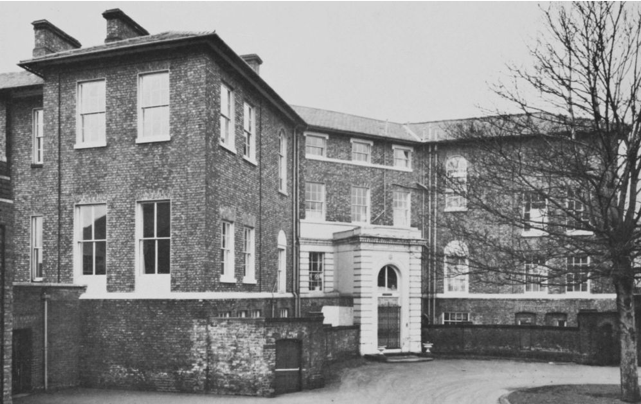The photograph of Mill Mount School, York has a special memory for me. I am a chronically too early person and used to stand alone at the pupils’ entrance at the left of the picture. Every morning I heard Miss Willoughby tapping along, I looked down not wanting to have eye-contact. One morning the tapping did not go up the steps to her entrance but – oh no! – came towards me. ‘Do you live a long way from the school?’, she asked in her imperious tones. ‘No, Miss Willoughby’, I squeaked. ‘Don’t come so early’, she said and I ceased to. Nowadays teachers would have asked why I came half-an-hour too early but those were different times.
Margery Gertrude Willoughby, headmistress of the former Mill Mount Grammar School for Girls from 1946 through to 1966, was born on 13 December 1905 in Chapel en le Frith, Derbyshire, and died in York on 10 June 2001. During the 1920s she read History at Girton College, Cambridge.
Mill Mount Grammar School was a place for those who passed their ‘11+’ so the pupils selected were those deemed ‘academically intelligent’; I believe, however, that it’s not ‘how intelligent are you?’ but ‘how are you intelligent?’ Nevertheless, going to grammar school did give girls more career possibilities and an alternative to marriage. Having a career and a husband and children was unusual at the time of the opening of Mill Mount in 1920 until perhaps the sixties. Mill Mount ceased to exist as a single sex school with restricted entry in 1985, when it became a co-ed comprehensive.
How many girls did Miss Willoughby reign over? Thousands. She was a regal person sweeping into morning assembly wearing her university gown and was head for twenty years – about a hundred girls started in the first form each year. She always taught Ancient History to the first-formers which was a means of getting to know us I now realize. I was a pupil at Mill Mount from 1959 through to 1966. We were in awe of her, but she was more aware of us than she gave away. I, and I believe my fellow-pupils, did as little as possible to attract her attention. Still she was constantly on the look-out for potential ‘university girls’. She wanted girls to have an alternative to an intellectually undemanding job and marriage, although many of us longed for Mr Right. Yet many of us were able to have challenging careers and Miss Willoughby deserves some credit for that.
Only once did I witness her showing emotion. It was the morning after the death of Sir Winston Churchill. It had been my turn to read the lesson from the Bible. Miss Willoughby called me into her office and told me she would do it that day. Which passage she read, I cannot recall but she struggled not to weep.
Miss Willoughby also served as a magistrate in York, no doubt this was a frightening experience for those brought before her.
Rose Berl
Sources:
Register of Births and Deaths; The Press, York, 13 June 2001; ‘The Windmill’, 1920 – 1985 (the Mill Mount Grammar School magazine), York Explore Archives.
Image credit The Windmill, Mill Mount Gramma School Magazine

